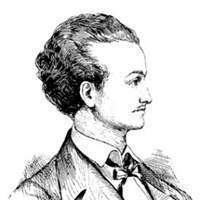Plácido’s Farewell to His Mother
written in the chapel of the Hospital de Santa Cristina on the night before his execution
translated from the Spanish by James Weldon Johnson
If the unfortunate fate engulfing me,
The ending of my history of grief,
The closing of my span of years so brief,
Mother, should wake a single pang in thee,
Weep not. No saddening thought to me devote;
I calmly go to a death that is glory-filled,
My lyre before it is forever stilled
Breathes out to thee its last and dying note.
A note scarce more than a burden-easing sigh,
Tender and sacred, innocent, sincere—
Spontaneous and instinctive as the cry
I gave at birth—And now the hour is here—
O God, thy mantle of mercy o’er my sins!
Mother, farewell! The pilgrimage begins.
Despedida a mi madre
en la capilla
Si la suerte fatal que me ha cabido,
Y el triste fin de mi sangrienta historia,
Al salir de esta vida transitoria
Deja tu corazon de muerte herido;
Baste de llanto: el ánimo afligido
Recobre su quietud; moro en la gloria,
Y mi plácida lira á tu memoria
Lanza en la tumba su postrer sonido.
Sonido dulce, melodioso y santo,
Glorioso, espiritual, puro y divino,
Inocente, espontáneo como el llanto
Que vertiera al nacer: ya el cuello inclino!
Ya de la religión me cubre el manto!
Adios, mi madre! adios—El Peregrino.
This poem is in the public domain. Published in Poem-a-Day on February 19, 2023, by the Academy of American Poets.
“Plácido’s Farewell to His Mother” was first published under the Spanish title “Despedida a mi madre” in Poesias completas de Plácido (Libería Hispano-Americana de Mellado, Contreras y C, 1856). In the appendix of James Weldon Johnson’s anthology The Book of American Negro Poetry (Harcourt, Brace and Company, 1922), an English translation appears that Johnson offers as an improvement upon William Cullen Bryant’s translation of the same sonnet, printed just beside it. In the foreword to the anthology, Johnson writes, “It is curious to note how Bryant’s translation totally misses the intimate sense of the delicate subtility [sic] of the poem. The American poet makes it a tender and loving farewell of a son who is about to die to a heart-broken mother; but that is not the kind of a farewell that Plácido intended to write or did write. The key to the poem is in the first word, and the first word is the Spanish conjunction Si (if). [. . .] Bryant either failed to understand or ignored the opening word, ‘If,’ because he was not familiar with the poet’s history.” As Johnson’s rendering of the title suggests, the original poem was written shortly before the poet’s impending death: Plácido was executed on June 28, 1844, for his alleged participation in La Conspiración de la Escalera, a suspected slave revolt in Spanish Cuba which never materialized.

